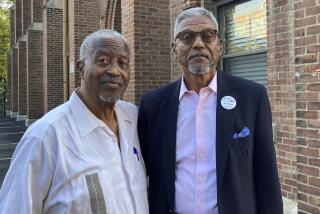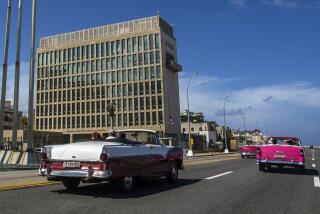Gulf War Malady’s Link to Nerve Gas Antidote Suspected
- Share via
WASHINGTON — A Pentagon-sponsored study has found grounds to suspect that an experimental nerve gas antidote given to as many as 300,000 U.S. troops during the Persian Gulf War may be a cause of the mysterious “Gulf War syndrome.”
Contradicting earlier official studies, the two-year analysis by the Rand Corp.--which will be released today--has concluded that the drug pyridostigmine bromide “cannot be excluded as a contributor” to a malady blamed for symptoms afflicting tens of thousands of veterans.
Since 1994, the Pentagon has spent $133 million researching the syndrome, whose symptoms include chronic pain, digestive problems, nausea, skin rashes, fatigue, aching joints, memory loss and concentration problems.
But this is the first time that government-approved research has sustained, rather than diminished, suspicions about a possible cause, officials said.
Defense officials stressed that the findings, which are based on an analysis of scientific literature, are not conclusive but point up the need for further study. “This is not a ‘Eureka!’ ” Dr. Sue Bailey, assistant secretary of defense for health affairs, said in an interview.
Even so, the findings are likely to stir controversy. Pyridostigmine bromide, commonly called PB, was an experimental drug in December 1990, when the Pentagon convinced the Food and Drug Administration to permit its use as American troops flooded into the Persian Gulf to push Iraqi invaders out of Kuwait. Rand said that 700,000 Americans were deployed and that from 20,000 to 100,000 may have “unexplained” symptoms.
Defense officials acknowledged that it is still unclear what the best dosages for different individuals may be. And, despite the findings of the Santa Monica-based research group, defense officials said that they consider PB an invaluable tool against poison gas and will order troops to take the drug, which is administered in tablet form, if the military believes enemies may strike with nerve gas.
“It is life and death versus the possibility of some long-term side effects,” Bailey said.
Officials also acknowledged that questions about the substance may further complicate their efforts to persuade some reluctant troops to participate in the military’s continuing anthrax vaccination program.
“There are concerns,” acknowledged Bernard Rostker, undersecretary of the Army, who heads a special Pentagon task force that looked into the problem.
Of the $133 million spent on researching Gulf War syndrome, $20 million has been earmarked specifically for research into the effects of PB. Rostker said that the government will consider whether to accelerate that research in view of this study’s findings.
PB is believed to be the only defense against soman, the fastest-acting of the nerve gases. It is used as a “pre-treatment” before exposure. Injections of additional medications are required afterward.
The treatment calls for troops to take 30-milligram tablets three times a day for as long as the threat of nerve gas continues. Officials believe that this dose should help soldiers withstand exposures of up to five times the usual lethal dose.
Nerve gases such as soman, sarin and Tabun are compounds known as organophosphates. They work by blocking an enzyme known as acetylcholinesterase, which is essential for the proper functioning of nerves and the muscles they control.
Acetylcholine is a chemical messenger that carries signals from one nerve to another. The enzyme acetylcholinesterase has the function of mopping up excess acetylcholine. If it fails, the nerve does not know when to stop and muscles go into spasms.
In low concentrations, these poison gases bring on headaches, loss of vision, excess salivation and breathlessness. At higher concentrations, victims stop breathing.
Though thousands of troops took the tablets for sustained periods during the Gulf War, authorities later concluded that the Iraqis had never built weapons with soman.
Dr. Beatrice A. Golomb, a physician at San Diego Veterans Affairs Medical Center and author of the study, said that the evidence supports several hypotheses of ways in which PB might have contributed to veterans’ ailments.
The substance might, for example, have interacted dangerously with other chemicals to which Gulf War soldiers may have been exposed, including pesticides and nerve agents, or might have been absorbed into the brain, aided by the special stresses of wartime, she said.
But she said the hypothesis most worthy of more study is the possibility that use of PB “might lead to changes in regulation” of acetylcholene, the nerve-signaling chemical.
Golomb said that her research consisted of studying the literature on Gulf War illness and analyzing it along with scientific literature on neurobiology. Several other recent studies have raised questions about the role of PB in Gulf War illness, but those had not until now received official scrutiny.
Officials said the study did not suggest that they might begin using any new treatments for the ailment.
In 1996, a study by the Institute of Medicine, a study group of specialists, concluded that PB was unlikely to be the cause of Gulf War illness. In 1997, a special Presidential Advisory Commission came to much the same conclusion, although it said that the substance could mix dangerously with other substances and was worthy of more study.
Matthew Puglisi, a specialist on the Gulf War issue at the American Legion offices in Washington, said he was not surprised by the latest finding.
He noted that the veterans group had always opposed the military’s use of PB because of the uncertainties involved in how large the dosage should be for individuals.
Puglisi said that the study “may have opened up a Pandora’s box” for the military, predicting: “I can’t imagine you’ll see a lot of people lining up for their PB.”
At the same time, he said, he gives defense officials credit for coming forward with a result that is likely to complicate their jobs.
Dr. Arthur Caplan, a bioethicist at the University of Pennsylvania and a former member of the presidential study group, said that he too was not surprised by the finding. But he said he is not hopeful that further research on PB will yield answers on what role it had in the mysterious syndrome.
This is because medical record-keeping in the gulf was poor and it will not be possible to say with precision how much PB was taken by the veterans who became ill. “There will remain a lot of uncertainty, even when the $133 million is gone,” he said.
More to Read
Sign up for Essential California
The most important California stories and recommendations in your inbox every morning.
You may occasionally receive promotional content from the Los Angeles Times.














